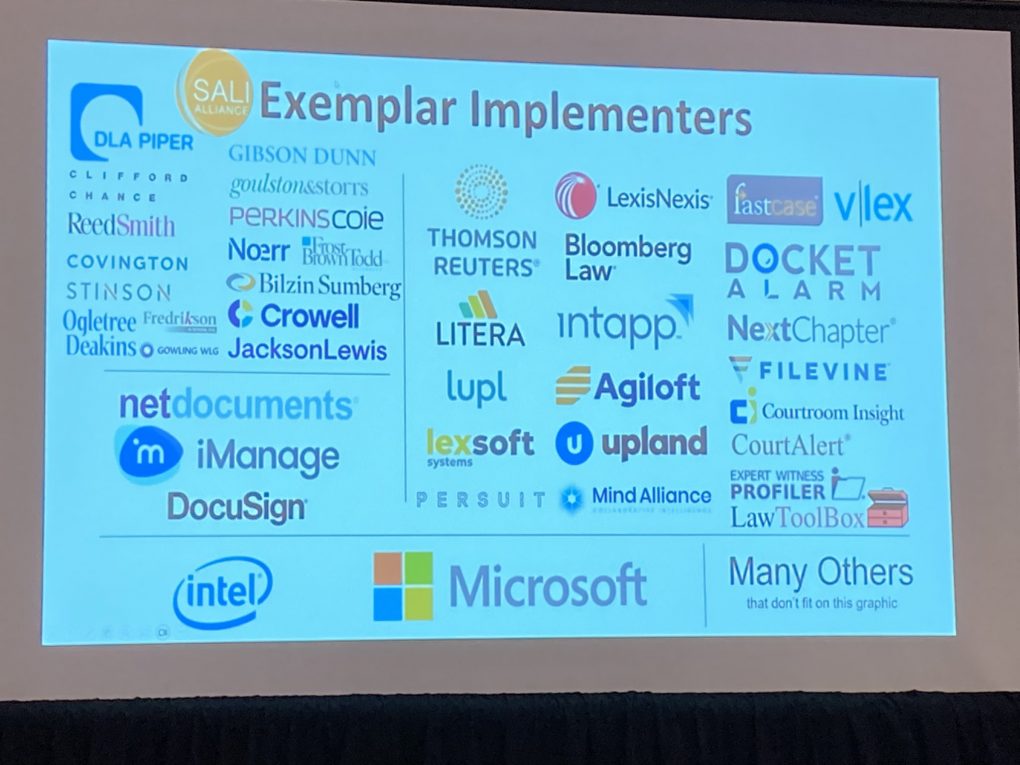My previous ILTAcon post was more of a vibe check, but I had some more concrete things that I learned and that I wanted to share as well.
Conference Tweeting is Dead
One reason for this post is that short form social media is a mess right now. There’s no perfect one for me yet – either the ownership is problematic, the ability to find and surface quality information is declining, there are tech or other barriers that prevent people that I want to hear from joining, or some combination of the above. And I’m not alone in feeling that way.
In the old days, by which I mean pre- 2018 or so, I could follow a conference hashtag on Twitter and get a good sense of what was happening and learn a few tips. And when attending a conference I also tried to pay that back by sharing tidbits I heard. Now, sometimes that went horribly wrong when either I misunderstood what was said or the speaker didn’t realize what they said was going to be broadcast to the world, so it wasn’t a perfect system.
Anyway, for better or worse, the “public back channel” is gone and I’m not sure if it’s coming back. I did get an invite to a slack which I didn’t use, so not sure if that was active or not. I do know I met a lot of people through conference tweeting and it’s somewhat sad that is gone.
Tagging People on LinkedIn
I went to a session on personal branding led by Nikki Shaver and Sameena Safdar. I know I have a personal brand that precedes me, I’m not 100% sure what people think of me, and I’ve never really worked at it beyond “be honest, do what I think is right, and let the chips fall where they may.” And boy, have the chips occasionally fallen. If you’d like to hone your brand, they provided helpful worksheets to go through which are available on the app.
One tidbit provided by Sameena that I think more people should know about is if you tag people in a post on LinkedIn, it will be suppressed until the people you tag interact with it in some way like commenting or adding an emoji reaction. If you really want to tag people on a post, do it in the comments.
Thomson Reuters Rework
I stopped by the TR booth just to see what they were up to beyond the Casetext acquisition. Well, it turns out… a lot.
As Jake Heller noted in his company update, TR and Casetext were not allowed to collaborate until the deal finalized, which it did the week before ILTA. So TR was chugging along doing its own thing. They have been working on their own internal AI build. They also brought on 300 human editors to retag and add 9-10 attributes (e.g. motion, cause of action, fact patterns). The claim I was given that this cuts research time in half. Also apparently the Key Number System has been overhauled and updated. I would love to see a redline on that.
Nuance – Dragon Legal Speech Recognition
Remember about 15 years ago and every commercial break featured that lady in headphones doing speech recognition software? Well she went to law school and this somehow maybe was the coolest thing I saw in the exhibit hall? The voice recognition software has been trained on legal terms and concepts and is also able to do basic document assembly.
Your grandpa’s dictaphone has gotten a 21st century makeover! Plus there’s a ton of accessibility benefits to using voice recognition tools.
Interoperability and Collaboration
SALI is taking off, y’all, and I couldn’t be more delighted to see an OPEN standardized taxonomy being adopted by the legal world.

Although I really didn’t do much live tweeting, I’m going to be a bit lazy and repeat what I said over there prompted by the taxonomy/collaboration/SALI sessions I went to:
- SALI and shared taxonomies allow firms and vendors to collaborate while at the same time protecting confidential firm data.
- All 13k SALI tags have definitions and are translated into multiple languages. Thanks Michael Bommarito! The way SALI can make connections across international jurisdictions and different names for same issues is so cool.
- Taxonomies are a language bridge that give LLMs context to understand relationships.
- Going forward, the influence and usefulness of ANY product is going to be directly tied to how interoperable it is with existing systems. You can still keep your own special sauce, but you better be able to crosswalk it into a standardized community adopted framework such as SALI.
As a reminder, I came to legal tech via law libraries. This taught me something huge: locked down silos of knowledge only benefit increasingly large vendors and greatly inhibit innovation. And I’m not just talking about WEXIS. In their digital transformation of knowledge work, libraries gave over a lot of control of their content and work to vendors that provide catalog and infrastructure software.
(I’m never going to get a box of See’s candy at Christmas.)
Now think about this:
Ivy Grey of Wordrake dropped this really interesting statistic during her co-presentation with the Intellek folks about their collaboration: 90% of lawyers write every day and 60% of legal work occurs in documents.
Josh Hogan of NetDocuments demo’d a beta document classifier powered by LLM-baked AI and SALI tags. The combination of SALI tags, documents, and vendors has so much potential. Not just “lawyer work”, but every type of work and user that touches this world. I’m so optimistic (and desperately hoping) legal stays on this trajectory and continues to create and use tools that are not locked down and allows us to work collaboratively and build upon each others successes.
We go faster and farther together.

